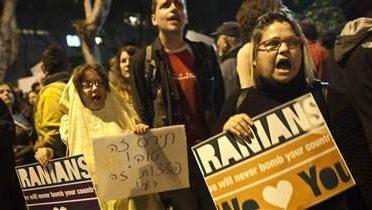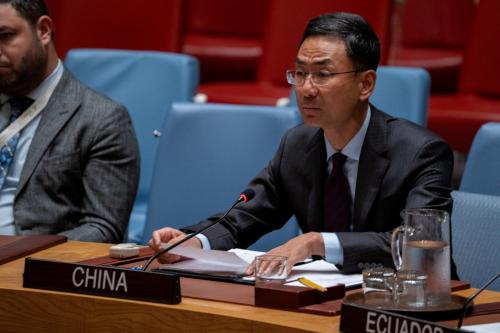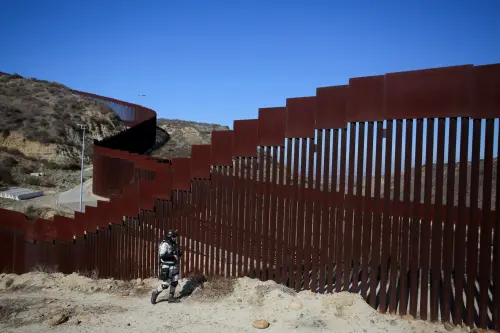Editor’s Note: For Campaign 2012, Suzanne Maloney wrote a policy brief proposing ideas for the next president on Iran. The following paper is a response to Maloney’s piece by Shibley Telhami. Michael Doran also prepared a response arguing that the most consequential decision the president faces this election year is determining the fate of Iran’s nuclear program.
Get audio and video from our Campaign 2012 event on Iran »
Suzanne Maloney draws attention to many important angles of the international crisis over Iran’s nuclear program and America’s policy choices. But there are also others for Washington to consider—namely, the Israeli and Arab dimensions. Here are ten brief points for the next president to reflect on.
First, an Israeli strike on Iran between now and the 2012 elections would reshuffle the deck on the Iran nuclear issue and change the possibilities for this administration and the next. If there is no such strike before the elections, the new administration will have to concern itself immediately with whether or not Israel will strike on its own and draw the United States into a military confrontation with Iran. The centrality of the Iranian nuclear issue for the United States cannot be separated from Israeli concerns. A new president will have to begin by managing this as a triangular relationship.
Second, just as many prominent Israelis are walking away from calling Iran an “existential threat”—because doing so portrays Israel as a weak state, lowers its public’s morale, and limits its options—the United States needs to walk away from calling a nuclear Iran the greatest strategic threat the United States faces today. Such framing has ramifications for political, economic, and military priorities as the United States faces greater challenges to its standing in the world: the global shift of power toward Asia, diminishing American economic clout, even the growing gap between the rich and poor and diminishing social mobility at home. A nuclear Iran poses challenges, but even if Iran ultimately develops nuclear weapons, they are manageable ones.
Third, whether or not Iran moves to build nuclear weapons, there is little doubt that it is moving toward having the capability to do so. Its success in that effort is a function not only of opportunity and resources, but also of priorities and will. What the United States and other international partners do affects both Iran’s costs and its incentives. Tough sanctions may limit the resources available to the regime and create some internal fissures, but they can also send the signal that the aim is regime change and that Iranians are better off riding the hardship and accelerating their nuclear program as a deterrent against future threats. Sanctions will slow Iran’s program only if, at an appropriate time, the United States and its allies put on the table a deal that provides a face-saving measure to the Iranians.
Fourth, while such a deal is theoretically possible and some Obama administration officials have been hopeful that the costs of sanctions are providing incentives for Iranian rulers to meet its terms, they are not likely to comply. The Iranians have always given themselves a face-saving way out by denying that their aim is acquiring nuclear weapons and by even taking a religious position against such weapons. But no one believes that Iran would give up the right of uranium enrichment on its soil—something that the Israelis are insisting on as a way of heading off an armed strike. The extent to which a compromise is possible has in the end to do with the limits on Iranian enrichments. Nothing so far suggests that a deal acceptable to both Israel and Iran is possible.
Fifth, the events in Syria may actually provide Iran with a greater incentive to move rapidly toward nuclear capabilities. Syria had been Iran’s only state ally in the Arab world and a link to Hezbollah. The weakening of these two would make Tehran more insecure and more inclined toward nuclear capability as the ultimate provider of deterrence against foreign intervention.
Sixth, an increasing source of anxiety in the Arab world is that there may soon be two non-Arab nuclear powers (Iran and Israel). Arab states may respond by nuclearizing. Saudi Arabia would be the most inclined and capable Arab country to go nuclear. As Egypt comes out of its revolutionary transition, public pressure will mount on Cairo to follow suit.
Seventh, while Arab governments are particularly concerned about the growth of Iranian power, Arab public opinion is caught between concern about Iran and hope that Iran could give Israel and the United States black eyes. Arabs polled, including those in Saudi Arabia, rank Israel and the United States as bigger threats than Iran. And most Arabs reject international pressure to curb the Iranian nuclear program, because of a sense of “double standards” in the international position. While an Iranian bomb would pressure Arabs to want their own, it would also increase the Arab public’s admiration for Iran in a manner that is potentially threatening to Arab rulers.
Eighth, even if a deal is reached with Iran to limit the level of enrichment on Iranian soil, Arabs will likely feel compelled to move in the nuclear direction unless a regional forum can put downward pressure on regional proliferation—for example, through a convention to move toward a nuclear-weapons-free zone in the Middle East. It is improbable that Israeli leaders would be open to the idea of reducing, let alone ultimately giving up, their nuclear weapons before there is full and stable peace with their neighbors.
Ninth, while disarmament in the short to intermediate terms is improbable, the beginning of a regional convention toward that end would be consequential: it would create regional engagement, which would have a large impact on public opinion across the region, and would place downward pressure on proliferation while providing face-saving arguments for leaders who want to avoid the nuclear course. However, such a conversation is unimaginable without parallel credible peace negotiations between Israel and its neighbors.
Tenth, given that the above developments remain unlikely in the foreseeable future, the risk of war will remain high before, and even after, the American elections. There is no doubt that the Israeli threat to strike Iran has a political aspect, or that the costs for Israel of a strike would be enormous. But the strategic reality still holds: Israel may be able to live with a nuclear Iran, but it is hard to believe that the Israelis would be assured by the kind of possible negotiated deal with Tehran or that they would refrain from doing all they think they can to slow Iran’s program. The potential risks to American interests are huge, and any administration must prepare for all contingencies. But precisely because of the enormous consequences, no idea or political effort should be avoided, even if its prospects are seemingly limited—including using the upcoming UN conference on a nuclear-weapons-free zone in the Middle East to launch a serious regional engagement that changes the conversation and plants the seeds of new initiatives after the American presidential elections.
The Brookings Institution is committed to quality, independence, and impact.
We are supported by a diverse array of funders. In line with our values and policies, each Brookings publication represents the sole views of its author(s).




